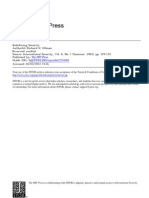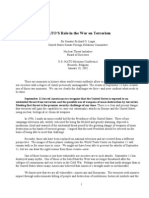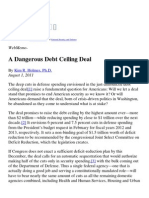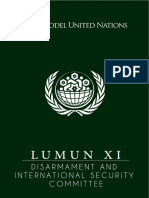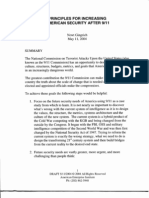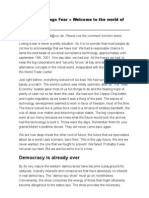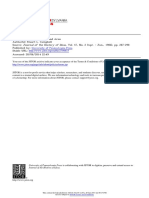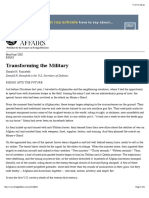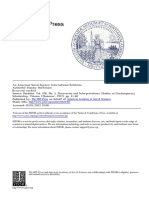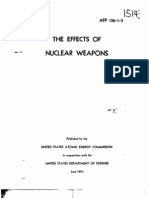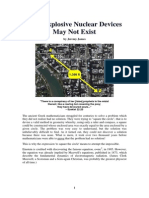Brodie - Atom Bomb As Policy Maker
Brodie - Atom Bomb As Policy Maker
Uploaded by
radetzkyCopyright:
Available Formats
Brodie - Atom Bomb As Policy Maker
Brodie - Atom Bomb As Policy Maker
Uploaded by
radetzkyOriginal Title
Copyright
Available Formats
Share this document
Did you find this document useful?
Is this content inappropriate?
Copyright:
Available Formats
Brodie - Atom Bomb As Policy Maker
Brodie - Atom Bomb As Policy Maker
Uploaded by
radetzkyCopyright:
Available Formats
october 1948
The Atom Bomb as Policy Maker
Bernard Brodie
Volume 27 Number 1
The contents of Foreign Affairs are copyrighted.1948 Council on Foreign Relations, Inc.
All rights reserved. Reproduction and distribution of this material is permitted only with the express
written consent of Foreign Affairs. Visit www.foreignaffairs.com/permissions for more information.
THE
ATOM
BOMB AS POLICY
MAKER
By Bernard Brodie
re
IS now three years since an explosion over Hiroshima
vealed to the world that man had been given the means of
now been det
destroying himself. Eight atomic bombs have
IT
onated?
that
the
three
"atomic
at
tested
assuming
weapons"
were in fact bombs ?
and each was in itself a sufficient
that the promise of eventual benefits resulting from the
Eniwetok
warning
use
peacetime
of atomic
energy
must
count
as
nothing
compared
to the awful menace of the bomb itself. The
good things of earth
nor
cannot be
can
which have
dead
societies
men,
enjoyed by
lost the entire material
fabric of their civilization
survive as
integrated organisms.
Yet the dilemma nevertheless
faces us that the enforcement of
tolerable behavior among nations will continue for an indefinite
time in the future to depend at least occasionally upon coercion
or the threat of it, that the instruments of coercion
against
Great Powers will most likely be found only in the hands of other
Great Powers (who can dispense with them only by acknowledg
to forfeit whatever
liberties they may happen
ing their readiness
to
and
that
those
instruments appear fated,
blessedly
possess),
same
our
of
because
those
largely
imperfections of
society which
to include the atomic bomb and
make power necessary,
perhaps
other
comparable
instruments
of mass
destruction.
Individuals may
from this dilemma behind a
barrage
of high moral protestation,
usually combined with glowing pre
dictions of a better world to be. Such retreat is rendered doubly
sweet because it ismore often than not
accompanied by applause,
our
from
the
intellectual
especially
wing of
society. But the
nation
as
who desert
they
can.
a whole
simply
retreat
cannot
retreat
leave the others
from
the
to think
problem,
and
it through
those
as best
The impact of the atomic bomb on United States
policy has
thus far been evidenced most clearly in the almost frantic effort
to secure the
a system of international
control of
adoption of
an
atomic energy. It is difficult if not
to
find
historical
impossible
for
the
with
nation
which
this
has
eagerness
precedent
pursued
an endeavor which,
if successful, would
it of the ad
deprive
a decisive
vantages of monopoly
possession of
military Weapon.
Council on Foreign Relations
is collaborating with JSTOR to digitize, preserve, and extend access to
Foreign Affairs
www.jstor.org
FOREIGN AFFAIRS
i8
is bound to be temporary, but that has
To be sure, the monopoly
the monopoly
been true of new weapons,
possession of
always
whicn has usually been jealously guarded for as long as possible.
The United States is even now behaving in the customary manner
new weapons other than those based on the ex
concerning all
atomic energy, a fact which in itself sufficiently
release
of
plosive
demonstrates
that the exceptional American position on atomic
energy control is based on something other than national gen
other" is of course a well-warranted
erosity. That "something
is little
and politically
fear of living in a world which morally
one
we
in
which
different from the
have known but
addition is
of
atomic
characterized by multilateral
weapons.
possession
But the fear which engendered
the pursuit of international
control also provoked the resolve that any control scheme must
contain within
itself practically watertight
guarantees
against
evasion
or violation.
was
That
remains
and
reasonable
wholly
is that it greatly reduces
resolve, but its inevitable consequence
the chance of securing the requisite agreement. Two years of
Commission have re
work by the United Nations Atomic
Energy
sulted in some illumination of the problem but almost no progress
in securing formal sus
initiative
towards a solution. American
is a plain acknowl
the Commission
pension of the activities of
edgment of that fact.
But where does that leave us? It leaves us, for one thing, with
the unwanted bomb still in our hands, and, so far as we know,
still
pulsion
We
in our
exclusively
It
hands.
must
continue
our
search
for
us
leaves
to go on building more bombs,
also
under
the
com
and better ones if possible.
a workable
and
secure
inter
national control system by any corridor which reflects even a
to consider
we must also
begin
glimmer of hope of success, but
somewhat more earnestly and responsibly than we have thus far
what it will mean for the nation to adjust to an atomic age devoid
of international controls.
The ramifications of that adjustment
process are legion, but
of
all a continuing reconsideration
above
involve
certainly they
our
for
the
national
the effects of the bomb upon
security.
plans
narrow a
For those to whom "national
appears too
security"
concept
for
an
atomic
age,
there
are
at
least
three
observations
that might be made.
In the first place, as the world is now organized, and as it now
security is for all practical purposes synony
operates, American
ATOM BOMB AS POLICY MAKER
19
mous with world security. It is no longer a question whether our
that to be the case, though there is
political leaders understand
It is
much evidence that in the main they do so understand.
simply
that
we
have
reached
stage
where
large-scale
war
with
out American
Sec
borders on the inconceivable.
participation
which
is
concerned
national
ondly,
policy,
perforce
primarily
is the only policy upon which we as
with national
security,
to exercise any direct influence, and it is our
citizens can
hope
international
the
only channel for affecting
policy. Thirdly,
are much more
to prosper if
of
policy planners
likely
projects
man
at least
to
conform
occasionally
aspirations which the
they
on the street
to the
fully shares and understands. To him, and
serves him, the
who
of
the
United
States
is
security
politician
on the
and
World
important.
security,
supremely meaningful
?
otner hand, is an abstraction which
gains meaning ? at least
to induce him to pay a
only to
meaning sufficient
price for it
en
that American
the extent that he is persuaded
security is
seem
a
hanced thereby. The difference may
semantic
superficially
the
one, but it is more than that. It affects very profoundly
one
of
of
the
kind
risks
will
and
the
and
accept
question
degree
character of the price one will pay to achieve security. It certainly
affects the basic method by which we proceed to our goal.
Lest
we
adopt
too
patronizing
an
attitude
towards
the
con
victions of the layman or the politician,
let us consider for a
moment
however dimly he may perceive them,
the
propositions,
rest. At least four such
convictions
which
those
upon
propositions
are
all
of
which
be
listed,
may
basically unaffected By the exist
ence of the atomic bomb.
at its
I. International
organization
existing level of develop
ment
to
is obviously
either world or
inadequate
guarantee
American
This
fact
and
security.
explains
partly justifies the
most
of
students
of
international
relations with
preoccupation
procedures for developing and improving existing bases for inter
national cooperation. But exclusive preoccupation with such ends
leaves a large gap which it is inexcusable to ignore, and that for
a reason which
our second
provides
proposition.
II. It is clear from any
and realistic appraisal of
dispassionate
the forces at work in international relations today ?
the kind of
it
is
which
the
first
of
the
appraisal
responsibility
specialist in the
?
a
to
field
that
provide
highly reliable and effective mechanism
can
for the collective guarantee of
security
hardly be deemed to
FOREIGN AFFAIRS
20
lie within the range of conditions reasonably to be expected within
our time. At any rate, the
is not high. The
degree of probability
atomic bomb makes that circumstance more tragic, but it does
not otherwise alter it. However much the mechanism
described
a
matter of
deserves working for, it is certainly
ordinary prudence
to take heavy insurance against failure or even against too slow
a rate
of achievement.
our
III. Whatever
concerning the future of inter
predictions
must take into account the
national cooperation,
they
? following
the ob
basic dilemma: The pursuit of security against war
in
all
others
the
above
takes
modern
precedence
jective? which
is not inevitably identical with the pursuit of smoother
world
intimate
international
the two being
and more
cooperation,
out little
latter
where
the
holds
promise of
especially divergent
one
success. Where conciliation fails,
must take steps
significant
which may make that failure more certain and more complete.
Where
the
opponent
refuses
to reason,
one
can
only
appease
or
in the flexibility and subtlety
threaten. There are wide variations
with which the statesman may either appease or threaten, and
the degree of skill which he brings to his task is supremely im
it is in the main true that appeasement
tends
portant. However,
or
to encourage
further unreasonable
demands;
"impossible"
while the threat or warning, however effective at the moment,
tends to wound the opponent and to stimulate in him the desire
to threat in the future. Nevertheless,
to be less vulnerable
the
statesman may at any time be faced with a choice between these
two alternatives and these alone. He will do well to guarantee for
of freedom of choice between
himself in advance the maximum
them.
of threat or warning, adequate national
the
purpose
statesman who possesses
it can
is
strength
indispensable. The
choose whether to appease or warn; the one who lacks it can only
so
is
appease. As General Eisenhower
neatly put it, strength
can
required to cooperate, weakness
only beg.
IV. For
ii
In a world in which none of the Great Powers felt threatened
one or more of the others, we could expect to see a salutary
by
devices resting on the above propositions.
neglect of security
that
But it is clear from the recent behavior of our Government
it feels itself exposed to a threat from the Soviet Union, and it is
21
ATOM BOMB AS POLICY MAKER
measures which it is
pursuing in
equally clear that the
to
broadest
of
the
that
exposure enjoy
response
popular
feeling
some of those measures
entail
support. Moreover,
undeniably
our
aggravation of the tensions between the Soviet Union and
selves. Is it possible to look past the difficulties of the moment
to see the basic reasons for that concern ?
A senior American naval officer told this writer not so long ago
almost
that
"American
calculations
strategic
the
concerning
require
nent,
of great wars must envisage the Soviet Union as the oppo
if for no other reason than that she is the only foreign
Power
whose
ments
would
defeat
require
great
on
exertions
our
part."
That is a good, simple working rule for an admiral. It recalls
the old doctrine of the "natural enemy." It reminds us also that
there would still be a problem to concern us even if the Soviet
Union were something other than what it is; and that the fact
that the power system of today is a bipolar one has dominant
own. The main trouble with a
implications of its
bipolar system,
a
so
as
has
is
that
the
it,
target is all too
tersely put
colleague
The
unambiguous.
admiral's
statement
reminds
us
also
that
con
a concern with
cern with
and not nec
security is
possibilities,
or
certainties.
essarily with high probabilities
reason
which
if
the
the admiral gave were the
Nevertheless,
one which counted, there is no doubt that our attitudes and
only
our efforts
more relaxed
concerning security would be profoundly
than
they
are. There
are
reasons
special
residing
in the
character
of the Soviet state (or, if one insists, in the difference between
our two
events
systems) and in the
resulting from that character
(or difference in characters) which account for the special dangers
and
the present
acute
degree
of
tension.
on the part of the
space here, or competence
to
of
the
character
of the Soviet state
writer,
permit any analysis
or of Soviet-American
relations during the past three years. Nor
is such analysis necessary for our purpose. All we need to guide us
are a few
which will be obvious when
general observations
out but which may nevertheless
strike the reader as
pointed
some flavor of
having
novelty.
First of all, one might suggest that students of international
relations have perhaps muddied
the waters unduly by a some
concern
what excessive
with Soviet motives,
particularly with
the question whether the motives behind Soviet
obstreperousness,
or
and worse, are
primarily defensive
aggressive. That is not to
There
is not
FOREIGN AFFAIRS
22
are
Nor is it to complain that
argue that motives
unimportant.
are
motives
always difficult if not impossible to fathom, which is
true. The
to
is obliged professionally
certainly
psychoanalyst
reach conclusions about motives,
and it is noteworthy
that his
usually differ from those of the person whose
interpretations
behavior he is examining. What
is being suggested here is simply
act
so far as counteraction
in
that
dwarf
the
i,
may
importance,
is concerned,
the motive
from which
it leaps; and 2, that a
motive which stems from convictions which we cannot appreciably
influence
or alter
by any
reasonable
acts
on our
part
ceases
thereby
to be of much
us.
operational significance to
The significance of the facts that the Soviet Union
is a police
state and that its
organizing ideology posits among other things
the necessity of world revolution has been sufficiently elaborated
elsewhere. But a point which is generally overlooked and which
is of at least equal significance
is the following: the distinctive
it
quite naturally includes a special
ideology being all-pervading,
of previously
existing patterns of international
interpretation
relations.
That
fact
means,
among
other
things,
that
the
re
one can draw from western
con
assuring analogies which
history
states
of
amicable
relations
between
of
cerning long periods
are of much diminished
relevance. In
widely differing ideologies
almost all those instances we find ministers who otherwise repre
sent the most
a common
widely differing persuasions
holding
approach
the rules
to the
of
conduct
of
foreign
affairs,
a common
respect
for
the game.
Those rules, we are often told, elevated hypocrisy to the status
as the old saw goes, "is an
of a first principle. "A diplomat,"
honest man sent abroad to lie for his country." But there is
another aphorism to the effect that hypocrisy has at least the
merit of giving lip service to virtue. The "hypocrisy"
of western
statesmen has frequently
been
The con
enough
self-deception.
stant
to
in
the
of
instruments
higher principles
appeal
diplomacy
has almost always been something more than window dressing.
The margin of difference between declaration
and performance,
statesman well
had
nevertheless
which
the
limits
though wide,
understood and upon which he could base his expectations.
It is
a common
in
all
behavior
of
civilizations
that
short
falls
pattern
the aspirations
reflected in the norms, but the norms are not
thereby bereft of importance.
re
The Communist
explicitly and systematically
philosophy
ATOM BOMBAS POLICYMAKER
23
norms of international
conduct.
the previously
accepted
Jects
in the approach to the existing pat
The principle of expediency
tern is not
it is avowed and exalted.
simply indulged in,
The final and conclusive point relevant here is that the Soviet
one. Welfare,
in the
state if not a militaristic
Union is a military
to military
form of consumers goods and services, is subordinated
to a degree which also has probably never before
requirements
?
not in Nazi
in modern history
been approximated
certainly
the
While
butter."
before
vaunted
which
Germany,
"guns
no
Com
real
often
been
of
have
milder kinds
Socialists
pacifists,
to the present has ever had the
from Marx
munist philosopher
use for
indeed, and Lenin too, took fre
slightest
pacifism. Marx,
scorn upon it.
to
matchless
bend
their
occasion
quent
are
not matters of opinion. They are the
stated
The
points just
kind 01 conclusions which any normal intelligence operation pro
vides, except that the factual evidence which supports them is
than is usually available
far more abundant and incontrovertible
run of
to the
problems. It is the
intelligence officer in his general
kind of evidence upon which policy, as distinct from hope or
yearning, must be based.
of war.
These conclusions do not point to the inevitability
a
which will
They do point, however, to policy the realization of
at each recurrence of crisis serve to
Soviet
leaders
the
persuade
a
one.
Such
that the expedient
solution is the peaceful
policy
would no doubt also serve to reduce the frequency of crises. For
so far as international
the saving grace of the Soviet philosophy
are
is
unlike
relations
concerned
the Nazi
that,
ideology, it in
itself no time schedule. Hitler had to accom
corporates within
his ultimate goals not only within his lifetime but within
plish
to be much more
his years of vigor. The Soviet attitude
appears
that
convinced
The
be
Soviets
may
opportunistic.
unsnakably
war
and
must
world
there
between the Communist
be
ultimately
one. Since that conviction
is a
what they call the "capitalist"
cardinal doctrine of their faith, we can probably dojnothing
to alter it. What we can do, how
within the present generation
them each time the question arises that
ever, is to persuade
"The time is not yet!"
in
The problem to which we now return is the
of how to
problem
an atomic age, when the
act of
in
this
accomplish
persuasion
FOREIGN AFFAIRS
24
more
already precious objective of peace ismade immeasurably
precious by the immeasurably enhanced horror of the alternative.
since preoccupation
with the horror has brought us
However,
and
thus
offers
little promise of
far,
nothing positive
exceedingly
so in the future, it is time for a shift to a more sober
posi
doing
an
are a
tion. There
large number of questions
pressing for
and
them
of
of
consideration
answer,
many
requires
appraisal
?
of the atomic bomb as an instrument of war
and hence of
international politics ?
rather than as a visitation of a wrathful
deity.
No doubt the first question concerns the effect of the atomic
bomb upon the basic power
the United
between
relationship
States and the Soviet Union. Postponing
such
for a moment
as stem from our present but ad
considerations
qualifying
we see at once that one of the
temporary monopoly,
mittedly
most fundamental
changes created by the atomic bomb is that
itmakes possible/?r
thefirst time decisive military action between
two
the
great
centers
of
power.
recent war, Professor
In a brilliant study
published during the
William T. R. Fox based much of his analysis of Great Power
on the
that a war between the Anglo
relationships
proposition
American bloc on the one side and the Soviet Union on the other
would be almost inevitably bound to result in a stalemate, and
that common recognition of this fact
both sides would power
by
for the better) relations between
fully influence (presumably
them. His explanation follows:
The pressure which either the Soviet Union or the Western
powers can bring
to bear upon the other in its main centers of power is surely much
less than
is implied by the statement
that the two are the strongest forces in the world.
Not only are the points of direct contact few and inaccessible but the centers
are widely
can be effectively
carried only
separated. The armed power of each
to
over the seaward approaches
of
the
the
other.
American
control
way
part
to the New World will in any foreseeable future render a transoceanic
operation
of its land army
by the Soviet Union
superiority
impossible. The massive
a
should on the other hand discourage
the Western
powers from attempting
shores controlled
by the
large-scale
operation
against hostile
amphibious
Red Army.1
That proposition was not only true at the time of writing, but
it could also be argued that no conceivable evolution of the in
struments of war then
publicly known could have ?significantly
1
"The
sibility
Super-Powers:
for Peace."
New
and The
The United
States,
Britain,
York: Harcourt,
Brace,
1944, p. 102.
Soviet
Union
Their
Respon
ATOM BOMB AS POLICY MAKER
25
it. To be sure, strategic bombing was gradually de
in effectiveness,
and the striking range of bomber air
veloping
craft was slowly but steadily
with
the
increasing. However,
none
War
of
World
but
extremists
could
that
II,
argue
experience
was sufficient unto itself for
a war
strategic bombing
winning
a
great nation. Moreover,
against
despite the increasing range of
bomber aircraft, there were a variety of technical reasons, quite
to support the conclusion
that a
impressive in the aggregate,
program of strategic bombing over what might
comprehensive
be called intercontinental
distances would not become prac
ticable "in the foreseeable future." That conclusion assumed, of
in known types of bombs
course, an evolutionary
improvement
and incendiaries, roughly approximating
in magnitude
the de
score of years. At any rate, itwas as
of
the
velopments
preceding
as any
can be that a conflict
nearly certain
military prediction
between the two major centers of power would be a
?
? prolonged
modified
one
comparable
promising
in duration
the same finality
to the
of decision
two world
achieved
wars
and
not
in each of those
instances.
The atomic bomb has changed all that. Unless the number of
atomic bombs which it is possible for any nation to make in, say,
10
years' time is far smaller than the most restrained estimates
would
indicate, there can no longer be any question of the
of a strategic bombing campaign waged
"decisiveness"
primarily
with atomic bombs. Also, for a variety of reasons which cannot
be reviewed here but which are readily available elsewhere,2
distance no longer presents the same kind of barrier to effective
strategic bombing with atomic bombs that it does with chemical
bombs. With
atomic bombs, planes already in
service
military
could effectively attack from bases within the continental United
2
See especially
"The Absolute Weapon:
Atomic
Power
and World
edited by Bernard
Order,"
Brodie
also "The Atomic
Bomb
and the Armed
(New York: Harcourt,
Brace,
1946), p. 34-40;
Brodie
and Eilene Galloway,
Public Affairs Bulletin
No.
Services,"
by Bernard
55 (Legislative
Reference
reasons why
of Congress),
the same plane
can be
Service,
p. 42-45. The
Library
over much
effective
distances
with
atomic
bombs
than with
concern
chemical
bombs
greater
the intricate
between
such factors as the amount
of bombs which
a
basically
relationships
plane
can carry over any
the total military
effort expended
in carrying
it over that
given distance,
and the tolerable rate of loss of attacking
distance,
planes. Since the atomic bomb does enormously
more damage
than an equivalent
the cost per sortie which
load of chemical
is acceptable
bombs,
?
with atomic bombs
is also proportionately
in fact, to include 100 percent
greater
great enough,
loss of planes on successful
attacks. The greater
itself
cost; the fact that the plane
acceptable
need not be retrieved
the arrangements
for the rescue of the crew); and the
made
(whatever
additional
fact that a single atomic bomb, whatever
its weight,
is always a sufficient
for
payload
the plane is capable of carrying
the
any distance which
it, will have the effect of at least doubling
maximum
effective
range of any plane of B-29 size or greater.
bombing
FOREIGN AFFAIRS
26
important targets in the Soviet Union, which the same
not do if
planes could
they carried only chemical bombs. Thus,
to wage great
there is no absolute necessity
campaigns merely
to secure advanced
bases.
it is difficult to see
bombing
Finally,
how the decisive phases of a war fought with substantial numbers
of atomic bombs could be anything but short.
The corollary of the
made in the previous paragraph
is
point
that the atomic bomb nas deprived the United States of what
almost to absolute security against attack upon its
amounted
States
territories.
continental
Its
naval
supremacy
was
to
sufficient
it both against direct invasion of hostile land forces
guarantee
and against enemy seizure of bases close to our frontiers for large
scale bombing attack. A potential enemy might count on token
was akin to
raids, but nothing more. America's
invulnerability
that which Britain enjoyed through the centuries until the per
on the eve of World War I. The
language
fecting of the submarine
which Francis Bacon applied to superior sea power in his own
"
time, that itmight take as much or as little of a war as it liked,"
still largely held for the United
States, alone among nations.
to any
But with effective
intercontinental
bombing available
who
in
the
tools
substantial
numbers
holds
enemy
already in
our hands, that treasured
position is gone. The atomic bomb has
in military
effect translated the United States into a European
Power.
is lost, not all is lost. There
is still
However,
though Heaven
es
to
contend with. Three questions
the issue of superiority
pecially
concern
us.
Is clear
and
conspicuous
military
superiority
in an age of atomic bombs? If so, is it
for the
possible
possible
it vis-?-vis
its major rival? And what
United States to maintain
atomic
will be the political consequences of an effort to maintain
superiority?
to do more than outline
It is not possible in a few paragraphs
in each of these questions
the nature of the problem contained
and perhaps to indicate the fallacy of certain prevalent supposi
tions concerning it. Let us take the third question first.
in
There has long been a fashion among academic specialists
worse
as
to
futile and
the quest
international relations
deprecate
over its rivals.
on the part of any nation for
military
superiority
As the argument runs, the attempt is bound to provoke a similar
pursuit
on
race which
the part
of
inevitably
the rival,
results
the net
result
being
in war. Historical
an armaments
support
is of
ATOM BOMB AS POLICY MAKER
27
course not
lacking, especially if the historical instances be chosen
The prevalence of this doctrine has had a
with discrimination.
our frenetic
to
do
with
deal
great
pursuit of international control
of atomic
energy
at almost
any
cost,
including
the cost
of
neglect
to consider any
possible alternatives.
ing
There is of course an important element of truth in the idea.
But there is also much taken for granted in it which is not true.
It is not true, for example, and has not been true at least since
the industrial revolution began, that the so-called Great Powers
have been on an approximately
equal footing in terms of their
to compete in the production of those instruments of war
ability
that really counted. It could be said, for example, that it was the
Naval Treaty of 1922 which made the Pacific phase
Washington
ofWorld War II possible, for it assured to Japan something much
closer to naval parity with the United States than would have
been anywhere near her reach in any real building competition
a treaty. The
ensuing from the absence of such
Treaty did avoid
for a time a "costly"
naval building competition. But was not
the war with Japan immeasurably more costly ?And would Japan
have dared embark upon a war against an America boasting a
as it
naval power which was ?
easily could have been, without
any
untoward
strain
upon
the
American
economy
two
or
three times her own?
General propositions
should not be pushed too far, including
one
the
just stated, but there is much cant in the field of inter
national studies which needs to be brushed out. Those ro whom
armaments
competition
appears
disastrous
as well
as wicked
are
on the
inconsistent when they look back nostalgically
on
the marvelous
century and
relatively
peaceful nineteenth
r?le played by Great Britain
in helping to preserve that peace.
as a con
They will speak vaguely of Britain's
invulnerability
as
were
that
though
tributing factor,
invulnerability
something
handed down from on high. It was indeed Britain's
invulnerability
at home which enabled British statesmen to
an active
play such
and on the whole beneficent part in
the
peace
helping preserve
of Europe, but it was not
simply the accident of the Channel
which made Britain
invulnerable. It was her clear-cut naval su
over the Channel and
periority
adjacent seas, the impairment of
which Britain would not brooky which gave her that enviable
somewhat
position.
Returning
again to the atomic
bomb,
the issue is not whether
FOREIGN AFFAIRS
28
our country
its present superiority
in
ought to seek to maintain
atomic armaments but whether
it has any chance at all of suc
an effort. It has been
some
ceeding in such
argued by
(including
at one time the present writer) that it was in the very nature of
that the kind of clear and decisive military
atomic armaments
?
was feasible in the
that
in the
past
superiority
conspicuously
?
no
case of naval armaments
could
longer be realized. The
was
on
two
based
considerations:
first,
argument
fundamentally
that there was "no defense against the atomic bomb," and
second, that when a nation had enough bombs to overwhelm
its opponent in one surprise attack and was willing to make such
its opponent had
attack, it would make little difference whether
two
or
three
times
the number.
is now reason to believe that the situation
There
is not so
as all that. A great deal
on the total number of
simple
depends
bombs which it will be possible for the various Great Powers to
in any given period of time. Clearly, a three to one su
make
in numbers of bombs would mean one thing if the
periority
numbers of bombs on each side were numbered at most in the
scores or hundreds, and
something quite different (and much less
were numbered in the thousands. Information
significant) if they
which would enable private citizens to make intelligent estimates
rate of bomb
not been made
concerning
production has
public,
to
be hints in various quarters that the maxi
but there appear
mum feasible rate of bomb
is substantially
less than
production
was
two years ago. It is also clear that
assumed
being generally
the richer of the known deposits of uranium and thorium are
much more accessible to the United
States than to the Soviet
Union.
One may also assume that the enormous technological
lead
?
which the United States has over the Soviet Union
and which
?
is bound to mean a
shows no conclusive signs of diminishing
great potential advantage for the United States in the design of
the instruments for using the atomic bomb. The bomb by itself
has no military utility. It must be delivered to the target in some
kind of vehicle which, unless it is a free-flying rocket, is subject
or
to various kinds of attack. Marked
superiority in the vehicle
no
means
of shooting down the enemy's vehicles may be
in the
less important than superiority in numbers of bombs, especially
if those numbers are something less than gigantic. If those several
on the same side, the dis
are concentrated
types of superiority
ATOM BOMB AS POLICY MAKER
29
in atomic fighting power may be sufficient to warrant
parity
with outright monopoly.
comparison
The Soviet Union has been able, with the assistance of German
to build several types of
technicians,
jet-propelled fighters, and
she has also built several large bombers patterned after our B-29,
war.
some models of which were
impounded by her during the
But a few German
technicians are not going to make the dif
and an eagerly pro
ference between a backward
technology
one. Our lead in types of aircraft, in the ordnance of
gressive
combat aviation, and in anti-aircraft mat?riel should, or rather
could, be as great during the next 20 years as it was in the recent
war. The
is whether we will make the necessary
only question
our
to
effort
keep in the lead in
technology. That the
military
to over
Soviet Union will spare no effort within her capabilities
take us goes without saying.
We are often told that our monopoly of the atomic bomb is a
asset. It is, to be sure, in the sense that some
day it is
wasting
bound to end and we are constantly getting closer to that day.
But is our superiority similarly a wasting asset? In one respect,
at least, we know that it is not, for our fund of bombs is
increasing
steadily during the period in which the Soviet Union remains
without any. On the day that the Soviet Union produces its first
bomb, we will have many more than we do at present. What
on a
happens thereafter depends
large number of variables. But
forward
from
the
present, we may say with a good deal
looking
of assurance that our present superiority
in atomic armaments
will increase considerably before it begins to wane, that it may
continue to increase even after the Soviet Union
is producing
a
that
and
it
in
be
time
thereafter.
At
bombs,
may
waning?
long
we
as
to
know
that merely
is usually
any ?rate,
distinguish
we are safe)
done
between
the monopoly
which
(in
period
we are lost) is not
and the post-monopoly
period (in which
enough.
out that it is easy to be over
One might
incidentally point
subtle concerning
the political
of our present
consequences
to get behind
of
the
bomb.
of
The
the
intellectual
monopoly
duty
the obvious too often
into
him
the
obvious or
betrays
ignoring
even
a
denying it.We have heard
good many references to the
a weapon ot mass destruction,
fact that the atomic bomb,
being
is not really
handy for diplomatic manoeuvring. We have been
told also that since we would never use it
against cities inhabited
FOREIGN AFFAIRS
30
it would not help us one whit in stopping
by friendly peoples,
Soviet armies from overrunning Western Europe. The latter ob
servation happens not to be strategically
correct, since the de
cities and industries would make a great
struction of Russian
deal of difference in the ability of the Soviet armies to overrun
or to maintain
Western
in that area if they
themselves
Europe,
there.
But
the
fact
remains
that
bomb is today
the
atomic
got
our
means
for
substantial
power
only
immediately
throwing
event of
in
the
Union
Soviet
the
flagrant Soviet ag
against
Soviets
The
the
underestimate
may
power of the bomb
gression.
own
our
but
indeed,
(as may,
leaders),
military
they cannot be
war now it will be
If
oblivious
of
that
fact.
choose
entirely
they
either because they underestimate
the bomb even more grossly
than they appear to or because they would rather face the hazard
now
our
when
bombs
are
few
than
later
when
they
are
many.
the effects of the atomic bomb upon our military
Concerning
and strategic plans, we must recognize first of all
organization
that,
to
the matter
Clemenceau,
is much
too
im
paraphrase
?
or to the
to
be left to the generals
either
portant
politicians
of security policy demands anticipa
for that matter. Formulation
tion of probabilities with due regard to what is politically possible
or feasible. But consideration
of the latter may too easily de
generate into preoccupation with what is politically safe. Political
have neither the time nor the inclination to
leaders, moreover,
with the long-term significance of changes
themselves
preoccupy
in
and
technology,
military
rarely
the
must rely upon
thing of it if they do. They
to a
who
aides,
military
belong
profession
?
conservative
markedly
degree
and
character
of
to make
competence
it is easy
though
?
that
conservatism
any
of their
as
long recognized
the advice
to
who
the
exaggerate
have
vested
service and personal interests which influence them consciously
or
whose talents are not primarily dialectic, and
unconsciously,
The respon
who are saddled with tremendous
responsibility.
tendencies already
sibility powerfully reinforces the conservative
present
as a result
of nurture
and
training.
We
are
therefore
not
to find
leaders, or the civilian officials whom they
military
likely
advise, accepting readily upon the advent of some revolutionary
military device that drastic adjustment which free and objective
as necessary or at least desirable.
inquiry may indicate
to find
It is a little startling, some three years after Hiroshima,
our
still apparently un
of
the military departments
government
ATOM BOMB AS POLICY MAKER
to think in terms of what strategic effects are to be
prepared
from the use of any given number of bombs. The
expected
national safety will of course demand close secrecy concerning
conclusions reached, but in this instance there is reason for be
the absence of thinking
is concealing
lieving that "security"
rather than the import of the ideas derived. For example, in the
inMarch
1947 on "The
paper prepared by the War Department
on
there is a
National
Bomb
Atomic
the
Effects of
Security,"
a
number of bombs.
reference to something called
"significant"
is then explained only as indicating
The meaning of "significant"
an
that number of bombs which would "provide
important
one
not
the
is
The
only
military profession
military capability."3
itself with catch phrases, but when we
which habitually
betrays
think of the absence of logic usually inherent in such sacrosanct
as
phrases
fleet"
"balanced
or
"balanced
we
force,"
cannot
be
about the precision of thought behind the "im
optimistic
portant military capability."
We know that one bomb will not win a war against a major
Power, since it took two to produce the surrender of an already
defeated Japan. The same may reasonably be held to be true of
five or ten. But there appears to be little idea anywhere what
and even less conception of how
number would be "significant"
it takes to make the weapon "decisive." Much will of
many
on how the bombs are used, but then the
course
sig
depend
nificance of the whole issue is that the number available and the
estimates concerning the capabilities of that number will in large
are used.
part govern the way in which they
It is not easy to extrapolate the strategic effectiveness of atomic
bombs from the experience with strategic bombing gained in the
too
war.
recent
There
are
too
many
differences,
that
besides
of mag
nitude of destruction per bomb or per plane, between bombing
with chemical bombs and attacking with atomic bombs. It is not
even
simple
matter
to determine
the
factor
of
increase
in power
load of chemical bombs.
of the atomic bomb over an equivalent
But we do have enough data to provide the basis for some in
tensive research which might throw some light on the problem.
What we need to know is: "How many bombs will do what?"
And the "what" must be reckoned in over-all strategic results
rather than merely in acres destroyed.
1The War
The
specific
in the Public
Department
Paper was published
reference
above is to page 67 of the Bulletin.
Affairs
Bulletin
No.
55 already
cited.
FOREIGNAFFAIRS
3*
The evidence is presumptive
only, but nevertheless
impressive,
that our military planners are thinking of an atomic bomb which
is an "important
an
but nevertheless
military
capability"
only
a decisive weapon. The chief
rather
than
ancillary
danger is that
the inevitably transitory nature of the conditions
presumed will
not be
or in time.
of what the
recognized sufficiently
Regardless
Soviet Union may accomplish in the field, our own
production of
atomic bombs is proceeding
for re
apace, and the justification
as an
one is bound to
garding the weapon
ancillary
evaporate as
our
stockpile
accumulates.
IV
If we consider national defense
policy in its broader aspects,
and look beyond the period of American
of atomic
monopoly
we
see
that recognition of the loss of American
invul
weapons,
to overseas attack and
of
decisions
nerability
quick
expectation
in the event of war will no doubt entail a violent wrench to our
in the old sense of the term,
defense traditions. Preparedness
which meant
mainly provision for great expansion of the military
services and of military production
after the outbreak of hos
even
will
less
tilities,
appear
adequate than it has been charged
in
with being
the past. What will that mean for the costs of
military preparedness?
the costs will increase, as they have already
Unquestionably
we should not assume that the restraints which
to.
But
begun
have always operated on the growth of military budgets will be
come inconsequential. There have been no
systematic studies of
the various factors governing
the size of military
budgets. It is
obvious that periods of international tensions generally stimulate
increases in military
and historians have dwelt on
expenditure,
the
scale
of
the
armaments
races
preceding
the
two world
wars.
But they have scarcely considered the significance of the fact
that in each case the extent of the arming, though large in com
con
was
more tranquil
parison with
relatively small in
periods,
trast to the
war period itself.
of
the
expansion
or
even
We are speaking here
ordinary human inertia,
partly
under
circumstances
where
war
appears
imminent,
and
in so far
as that inertia can be relied upon to be both
and
pronounced
enter into our calculations.
it should definitely
universal
But
econ
there is more to the matter
than simple inertia. Wartime
omies are characteristically
Both the toleration
fat-consuming.
ATOM BOMB AS POLICY MAKER
of them by the public and the physical possibility of maintaining
their inordinate pace depend on the fact that they are temporary
and recognized to be such. If there is to be fat to consume itmust
In other words, even from the point of
first be accumulated.
view strictly of defense needs, war economies can be inaugurated
too soon as well as too late. And if the relevant comments of
General Eisenhower while he was Chief of Staff of the Army can
that fact is recognized by the military
be taken as representative,
themselves.
There
is also the problem of avoiding
expenditure
military
which is improvident not only because it is too large but also
for example,
because it is misdirected. We have heard much,
our cities as a defense
of the business of
against atomic
dispersing
attack. It is clear that such dispersion would result in a tre
mendous
loss of fixed and sunk capital and, in all probability,
of industries than pre
in a less efficient spatial arrangement
one
even
if
should make the wholly un
viously existed. Thus,
our cities and
that wholesale
tenable assumption
dispersion of
the losses resulting would be tolerated by the public, the project
to be
might still appear
militarily wasteful. A great many combat
cost to
airplanes could be provided with what it would
disperse
even a
no doubt a
small
is
There
city.
relatively
margin for the
dispersion of key industries and services which would not loom
terms of the economy as a whole but which would never
large in
theless have important security results. If so, the accomplishment
of that objective should remain a maximum as well as a minimum
goal.
These
who,
on
observations
like the present
military
protection
are
of
writer,
even
course
not
deplore
so
substantial
to
reassuring
very
the necessity
a
portion
those
of spending
of
our
na
tional income as we are spending today. The limits referred to
are
we are still far from
fairly flexible and
having reached them.
And what will occur in this country when the conviction settles
is
atomic bombs is the
upon it that the Soviet Union
producing
error
tne
of
the
But
for
which we are now
future.
big question
was after all
some three centuries ago, when
paying
perpetrated
to escape
now is to
Galileo was permitted
burning. Our problem
of
the
nabit
the
with
atomic
and
the very
bomb,
develop
living
of the potential
inherent in it
incomprehensibility
catastrophe
well
make
that
task
easier.
may
You might also like
- Spreading KDocument47 pagesSpreading KDaniel Conrad100% (5)
- Susan Strange-The Retreat of The State-1996Document239 pagesSusan Strange-The Retreat of The State-1996Michi3110No ratings yet
- WSDC MotionsDocument6 pagesWSDC MotionsAli Hannan Malik100% (2)
- SparkDocument79 pagesSparkRajesh SinghNo ratings yet
- Jervis (1978) - Cooperation Under The Security DilemmaDocument49 pagesJervis (1978) - Cooperation Under The Security DilemmaThainá PenhaNo ratings yet
- Raymond AronDocument15 pagesRaymond Aronradetzky100% (1)
- The Strengths and Weaknesses of Article 2Document14 pagesThe Strengths and Weaknesses of Article 2Rochelle Antig0% (1)
- Fukureport1b PDFDocument48 pagesFukureport1b PDFMiguelAngeloNo ratings yet
- Popular Geopolitics and Motion Pictures: Cold War in James Bond MoviesDocument34 pagesPopular Geopolitics and Motion Pictures: Cold War in James Bond MoviesJonik KalalNo ratings yet
- Question No 1 IssDocument12 pagesQuestion No 1 IssMorgan Phrasaddha Naidu PuspakaranNo ratings yet
- Jan Feb 2020 Lay NegDocument33 pagesJan Feb 2020 Lay NegTanish KothariNo ratings yet
- Redefining Security - Richard UllmanDocument26 pagesRedefining Security - Richard UllmanFaig Abbasov100% (1)
- Redefining SecurityDocument26 pagesRedefining Securityvicterekhov_39969073No ratings yet
- Immediate download Mask of Chaos (1970) John Jakes ebooks 2024Document66 pagesImmediate download Mask of Chaos (1970) John Jakes ebooks 2024vagolluch100% (4)
- 2ac OffDocument11 pages2ac Offgunnym2397No ratings yet
- A Duty To PreventDocument6 pagesA Duty To PreventAnonymous QvdxO5XTRNo ratings yet
- Making Our Defense Strategy Work For This Century - Cheney and LodgeDocument2 pagesMaking Our Defense Strategy Work For This Century - Cheney and LodgeThe American Security ProjectNo ratings yet
- Ullman-RedefiningSecurity-1983Document26 pagesUllman-RedefiningSecurity-1983mehmetenesqatarNo ratings yet
- Goodnews Re Nuclear DestructionDocument4 pagesGoodnews Re Nuclear DestructionshorinjinNo ratings yet
- The United Nations: Aims and Structure: Clyde EagletontDocument23 pagesThe United Nations: Aims and Structure: Clyde Eagletontcomfortokosa55No ratings yet
- NATO'S Role in The War On TerrorismDocument8 pagesNATO'S Role in The War On TerrorismMaria BucuriaNo ratings yet
- Dahl - Atomic Energy and The Democratic ProcessDocument7 pagesDahl - Atomic Energy and The Democratic ProcessAmanda Devereaux-HunterNo ratings yet
- DisarmamentDocument2 pagesDisarmamentAiman ZafarNo ratings yet
- From James Madison To Thomas Jefferson, 4 February 1790Document5 pagesFrom James Madison To Thomas Jefferson, 4 February 1790Michael KochinNo ratings yet
- GlenbrookNorth WaYi Neg New Trier Round 1Document43 pagesGlenbrookNorth WaYi Neg New Trier Round 1roluycapgtumtijaeoNo ratings yet
- President Dwight D. Eisenhower's Farewell AddressDocument4 pagesPresident Dwight D. Eisenhower's Farewell AddresshdairdiwrkNo ratings yet
- Unipolarity Does Not Give The Unipole Greater Influence Over International OutcomesDocument11 pagesUnipolarity Does Not Give The Unipole Greater Influence Over International OutcomesqwejklasfdNo ratings yet
- NGO StatementDocument3 pagesNGO StatementAACS Co-repNo ratings yet
- Eisenhower Alex MainDocument6 pagesEisenhower Alex MainThiago HenriqueNo ratings yet
- Chuck Norris CounterplanDocument2 pagesChuck Norris CounterplanZippy4110100% (1)
- Debt Ceiling Deal and The Budget Cuts in Defense SpendingDocument7 pagesDebt Ceiling Deal and The Budget Cuts in Defense SpendingKeith KeithNo ratings yet
- Why Do You Need "Assault Rifles" and "High-Capacity" Magazines?Document7 pagesWhy Do You Need "Assault Rifles" and "High-Capacity" Magazines?Rob Olive100% (1)
- Article 9 Creation WatermarkDocument18 pagesArticle 9 Creation Watermarkanbalaganc.sclasNo ratings yet
- Statement Lugar 031802Document5 pagesStatement Lugar 031802SFLDNo ratings yet
- Redefining Security Richard Ullman PDFDocument26 pagesRedefining Security Richard Ullman PDFMacrina CasianaNo ratings yet
- Nuclear ProliferationDocument111 pagesNuclear ProliferationDaniel TangNo ratings yet
- We MeetDocument13 pagesWe MeetKhalid Hussein SharifNo ratings yet
- I Even Told Him I Just Need The Plan Text and He Still Refused Tole Me 10 BeforeDocument11 pagesI Even Told Him I Just Need The Plan Text and He Still Refused Tole Me 10 BeforeTanish KothariNo ratings yet
- International Law and The Use of Military ForceDocument49 pagesInternational Law and The Use of Military ForceThe EuropaeumNo ratings yet
- Kritik Answers 2Document893 pagesKritik Answers 2AmoghDendukuriNo ratings yet
- S4 MillerDocument31 pagesS4 MillerJeyson Stiven Bernal MontalvoNo ratings yet
- President Dwight D Eisenhower's Farewell Address I961Document5 pagesPresident Dwight D Eisenhower's Farewell Address I961mish_ranuNo ratings yet
- National and International SecurityDocument55 pagesNational and International SecuritySurdu MihaiNo ratings yet
- Cross TonDocument17 pagesCross TonBuruc AlexandruNo ratings yet
- DisecDocument36 pagesDisecHaseebEjazNo ratings yet
- Military-Industrial Complex Speech, Dwight D. Eisenhower, 1961Document4 pagesMilitary-Industrial Complex Speech, Dwight D. Eisenhower, 1961Carl CordNo ratings yet
- English Final Paper - Luka RDocument7 pagesEnglish Final Paper - Luka Rlukatroop777No ratings yet
- LCAnderson BeCo Pro Florida Blue Key Speech and Debate Tournament FinalsDocument11 pagesLCAnderson BeCo Pro Florida Blue Key Speech and Debate Tournament FinalskathyNo ratings yet
- National Security and Civil LibertiesDocument35 pagesNational Security and Civil Libertiesdk siNo ratings yet
- Conceptual Foundation of State Responsibility With Special Referance To Mob ViolenceDocument15 pagesConceptual Foundation of State Responsibility With Special Referance To Mob Violenceekta chnadrakarNo ratings yet
- Jervis - Cooperation Under Sec DilemmaDocument49 pagesJervis - Cooperation Under Sec DilemmaVictoria Den HaringNo ratings yet
- FO B6 American Enterprise FDR - 5-11-04 Gingrich Briefing Papers and Charts On Terror and Security (Fair Use)Document15 pagesFO B6 American Enterprise FDR - 5-11-04 Gingrich Briefing Papers and Charts On Terror and Security (Fair Use)9/11 Document ArchiveNo ratings yet
- Asymmetrical Warfare Roger BarnettDocument210 pagesAsymmetrical Warfare Roger Barnettboss_marchNo ratings yet
- The Wiki and The BlogDocument30 pagesThe Wiki and The BlogJosé MiguelNo ratings yet
- LAWS Negate-Dead Hand PIC and Spec TheoryDocument8 pagesLAWS Negate-Dead Hand PIC and Spec TheoryTrentonNo ratings yet
- Devilvision - 06Document14 pagesDevilvision - 06lucifer morning starNo ratings yet
- נאום הפרידה של הנשיא אייזנהאוארDocument4 pagesנאום הפרידה של הנשיא אייזנהאוארa1esh100% (2)
- US Court of Appeals: Addenum To Existing ComplaintDocument11 pagesUS Court of Appeals: Addenum To Existing ComplaintBretNo ratings yet
- World of TomorrowDocument23 pagesWorld of TomorrowFox HawkNo ratings yet
- Open Source National SecurityDocument10 pagesOpen Source National Securityroamer82No ratings yet
- Atomic Weapons and American Policy by J. Robert OppenheimerDocument12 pagesAtomic Weapons and American Policy by J. Robert OppenheimertNo ratings yet
- Speak Truth to Power: A Quaker Search for an Alternative to ViolenceFrom EverandSpeak Truth to Power: A Quaker Search for an Alternative to ViolenceNo ratings yet
- 认知领域的脆弱性 (英文)Document40 pages认知领域的脆弱性 (英文)harry HuangNo ratings yet
- Conflict PreventionDocument8 pagesConflict PreventionFitri AfriantiNo ratings yet
- Military-Industrial Complex Speech, Dwight D. Eisenhower, 1961Document5 pagesMilitary-Industrial Complex Speech, Dwight D. Eisenhower, 1961john-eagleland2100% (1)
- Aron's 4 ParetosDocument13 pagesAron's 4 ParetosradetzkyNo ratings yet
- Aron and de Gaulle PDFDocument11 pagesAron and de Gaulle PDFradetzkyNo ratings yet
- The Suitability of Grand Strategy For ToDocument4 pagesThe Suitability of Grand Strategy For ToradetzkyNo ratings yet
- Transforming The MilitaryDocument8 pagesTransforming The MilitaryradetzkyNo ratings yet
- Ecebb 12th See ColloquiumDocument2 pagesEcebb 12th See ColloquiumradetzkyNo ratings yet
- Mead Earle - Power PoliticsDocument14 pagesMead Earle - Power PoliticsradetzkyNo ratings yet
- Hoffman Stanley - IR As Social ScienceDocument21 pagesHoffman Stanley - IR As Social ScienceradetzkyNo ratings yet
- Wp91 GeopoliticsDocument25 pagesWp91 Geopoliticscorleone112233No ratings yet
- Dahl On PowerDocument12 pagesDahl On PowerradetzkyNo ratings yet
- Nuclear ReactorDocument13 pagesNuclear ReactorMouth with No teethNo ratings yet
- We Who Created The Morning Vs The U S District CourtsDocument21 pagesWe Who Created The Morning Vs The U S District CourtsSteven SchoferNo ratings yet
- 100 Most Probable QuestionsDocument96 pages100 Most Probable QuestionsIslavath BalajiNo ratings yet
- Full Annotated BibliographyDocument12 pagesFull Annotated BibliographyMisbah KhanNo ratings yet
- Bio 4 Kids EinsteinDocument3 pagesBio 4 Kids Einsteinsrp_appsdba100% (1)
- Css Past PapersDocument203 pagesCss Past PapersRamsha ChowdhryNo ratings yet
- Draft Resolution Example-1Document3 pagesDraft Resolution Example-1AyutasariNo ratings yet
- End of TimeDocument1 pageEnd of TimeAnonymouss11No ratings yet
- Toddlers Are A Holes It's Not Your Fault Ebook FreeDocument302 pagesToddlers Are A Holes It's Not Your Fault Ebook FreeJohnDelevar100% (1)
- Effects of Nuclear Weapons - SDocument294 pagesEffects of Nuclear Weapons - Sapi-3708163No ratings yet
- Mearsheimer Imperial by DesignDocument19 pagesMearsheimer Imperial by DesignMadalina StocheciNo ratings yet
- Nuclear Weapons and International Conflict - Theories and Empirical EvidenceDocument35 pagesNuclear Weapons and International Conflict - Theories and Empirical EvidencegoricaaaPNo ratings yet
- Nuclear Security Report - 2021Document137 pagesNuclear Security Report - 2021venusluxNo ratings yet
- Iran Security Council ResolutionDocument104 pagesIran Security Council ResolutionCmpoplinNo ratings yet
- Security in Contemporary WorldDocument7 pagesSecurity in Contemporary WorldARUN RAINANo ratings yet
- Why Explosive Nuclear Devices May Not ExistDocument20 pagesWhy Explosive Nuclear Devices May Not ExistJeremy James100% (3)
- Satyagraha A Peaceful Method of Conflict Resolution Prof. Vibhuti PatelDocument18 pagesSatyagraha A Peaceful Method of Conflict Resolution Prof. Vibhuti PatelCourtney HarrisNo ratings yet
- Victories & Difficulties - Rio de Janeiro Uranium Film Festival Report 2014Document66 pagesVictories & Difficulties - Rio de Janeiro Uranium Film Festival Report 2014Uranium Film Festival100% (1)
- Mahmoud Ahmadinejad's Prepared RemarksDocument11 pagesMahmoud Ahmadinejad's Prepared Remarksrpmackey3334No ratings yet
- New Chapters: Inland Transit Clause - 2010Document4 pagesNew Chapters: Inland Transit Clause - 2010rdsNo ratings yet
- Lecture Powerpoint: Physics: Principles With Applications, 6 EditionDocument107 pagesLecture Powerpoint: Physics: Principles With Applications, 6 EditionGhazi DallyNo ratings yet
- Times Leader 08-10-2013Document46 pagesTimes Leader 08-10-2013The Times LeaderNo ratings yet
- Hiroshima and Nagasaki - Lesson PlanDocument6 pagesHiroshima and Nagasaki - Lesson PlanRochelle UrbodaNo ratings yet
- FM17-1 Armor Operations Small UnitsDocument443 pagesFM17-1 Armor Operations Small Unitsdieudecafe100% (1)











